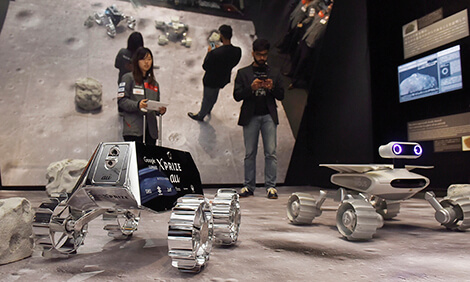


The Japanese and Indian lunar exploration teams—HAKUTO and TeamIndus—demonstrated their moon rovers at Space Museum TeNQ in Tokyo, Japan.
You’re probably familiar with foot races, car races, and boat races, but what about a moon race? Well, Internet giant Google is sponsoring a race to the moon! To run the competition, the company teamed up with the X Prize Foundation (XPRIZE). This organization designs and manages contests to inspire people to develop technology. Together, they named the race-to-the-moon contest the Google Lunar XPRIZE, or Moon 2.0.
First announced in 2007, the Google Lunar XPRIZE is open to teams of engineers, entrepreneurs, and innovators around the world. The goal of the contest is to inspire competing groups to develop low-cost methods of robotic space exploration. To qualify for the competition, each team had to have a contract with a launch pad by December 31, 2016. Out of 33 initial teams, five qualified for the contest—SpaceIL (Israel), Moon Express (USA), Synergy Moon (International), TeamIndus (India), and HAKUTO (Japan).
To win the Google Lunar XPRIZE, one of the five teams must be the first to accomplish three main tasks. The first task is to successfully land a spacecraft on the moon’s surface. The second is to use a robotic vehicle to explore at least 1,640 feet of the moon’s surface. The third is to send high-definition video and images back to Earth. These three tasks must be completed by March 31, 2018.
The first missions to the moon began in the late 1950s. Over the years, these missions have been carried out by the United States, the Soviet Union, the European Space Agency, Japan, India, and China. The first spacecraft to reach the moon’s surface was the Soviet Union’s Luna 2 in 1959. Since then, many successful moon missions have been completed, including the first manned landing on the moon by NASA’s Apollo 11 in 1969. However, there have also been many unsuccessful missions due to technical failures, especially in the early days of space exploration.
Competing for the Google Lunar XPRIZE has been a monumental challenge for all five teams. There is no guarantee that any of them will even win. But for the first team that is successful, the grand prize is $20 million. The team that comes in second place will receive $5 million. In addition, bonus prizes will be awarded to every team who completes certain technical milestones and spacecraft maneuvers. These maneuvers include completing one orbit around the moon and achieving a soft moon landing. Let’s hope that at least one of the teams competing for the Google Lunar XPRIZE will succeed!



























